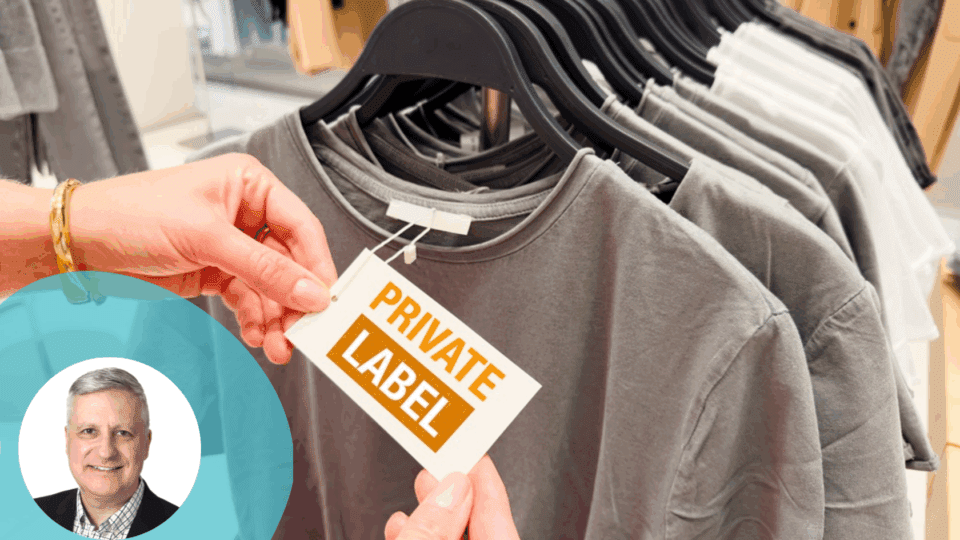As private labels and store brands have evolved over the last decade, the stigma of the “cheap, alternative, knockoff” brand has worn away. Retailers have built bona fide brands, touching all categories of the store. But what is interesting of late is that private brands have seemingly climbed another rung on the ladder of credibility and are now sought-after brands that consumers trust.
NielsenIQ (NIQ) data finds consumer sentiments around private labels are adding up to retailers’ owned brands being destination drivers and competing for loyalty against national brand counterparts. Sales are up for private brands and so is consumer demand. As global tariffs fluctuate and potential price increases loom, store brands could be set for more success.
In Retailers Consumers Trust
To be fair, part of the success of store brands can be attributed to retailers and grocers earning more loyalty and respect from the consumers they serve. It’s a natural connection — if a consumer loves a retailer, they’ll likely love their owned brand products.
At the same time, these products need to be good, and retailers have done a tremendous job answering that call. Target, Dollar Tree, CVS and many others have built multi-million- and billion-dollar store brands. Aldi continues to roll out more stores as their private brand-dominant approach continues to attract consumers too.
There’s trust in a retailer’s name and therefore their products. NIQ’s 2025 Private Label & Branded Products Report found that six in 10 consumers say they trust private brands because they’re endorsed by the retailer. By demographic, the data revealed this is especially true among millennials and Gen Z shoppers.
Additionally, the research discovered that nearly half of U.S. consumers said they’re buying more store brands than ever before and sales are growing faster than national brands, including:
- Private label sales grew 4.1% year-over-year, outpacing growth for national counterparts.
- Nearly three-fourths of consumers now view private labels as strong alternatives to national brands.
- Six in 10 said they’d buy more private brands if more were available.
As consumers grow more confident in private labels, and retailers earn their trust with high-quality products, the relationship could heighten between owned brands and consumers. NIQ’s private label report also found that, in general, 62% of U.S. consumers rely on buying the same brands they know and trust — and that could be more private brands over time.
Tariffs, Price Hikes Could Power Private Brands Further
Interestingly, as tariffs continue to disrupt the retail industry, potentially driving higher product prices and out of stocks, national brands could be in for a greater challenge from store brands.
For instance, NIQ data discovered that name brands overall are sold at a 19% higher average price point than private labels. Broken down by category, these price increases range dramatically:
- National brand frozen foods are only around 2% higher by average unit price
- Healthcare, home care, and paper products each see an increase in average unit price by around 40%
- Health and beauty name brands have an average unit price increase that’s 60% higher than store brands.
With some of these disparities, if consumers feel financial pressure, they may turn to more owned brands. However, just as national brands face potential issues around inventory, retailers also will need to ensure their private brands are on shelves. Consumers, loyal to a private brand or national brand, aren’t going to be happy if their favorite items aren’t in stock or stuck on ships at sea.
Taking a closer look at tariffs, NIQ research found that nearly 73% of consumers believe tariffs will impact the cost of the groceries they buy. Additionally, grocery and produce departments face significant impacts, with $15.2 billion and $6.7 billion in imported sales from Canada and Mexico, respectively.
Another category of note: non-alcoholic beverage prices already have increased in price by 30% in the last four years, and tariffs could generate a 26% increase in aluminum products prices and a 56% increase in plastics. Consider that 45% of soft drinks are sold in aluminum packages, and consumers could see a price surge.
The uncertainty of the current landscape could pressure consumers and their brand loyalties in new ways.
Store Brands 2.0
How consumers view store brands has shifted dramatically, and that relationship will only strengthen as retailers continue to expand their private label offerings. Certainly, if retailers struggle to keep products in stock or are forced to raise prices of products higher than expected, they could lose some of the newfound loyalty they’ve gained.
However, if owned brands are able to keep their price points consistently lower, as they have been, retailers might take advantage of the macroeconomic trends and drive store brand success higher. Frankly, as retailers revolutionize how they build private brands, they could be heading into a pivotal moment — one that offers a chance to evolve these store brands into powerhouse brands.
Steve Zurek is the VP of Thought Leadership for U.S. Advanced Analytics, NielsenIQ (NIQ). He is a CPG industry veteran with more than 30 years of experience in sales and category development, having worked for PepsiCo, Procter and Gamble, Gillette, Quaker Oats and Haleon (GSK) Consumer Health.





